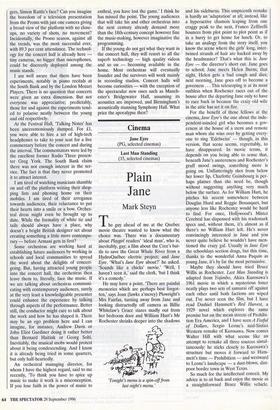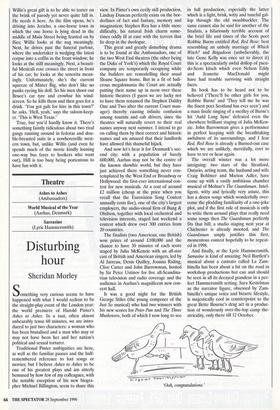Cinema
Jane Eyre (PG, selected cinemas) Last Man Standing (15, selected cinemas)
Plain Jane
Mark Steyn
The guy ahead of me at the Quebec movie theatre wanted to know what the choice was. There was a documentary about Playgirl readers' ideal man', who is, inevitably, gay; a film about the Cree's bat- tle to save the Great Whale River from a HydroQuebec electric project; and Jane Eyre. 'What's Jane Eyre about?' he asked. 'Sounds like a chicks' movie."Well, I haven't seen it,' said the clerk, 'but I think it's a comedy.'
He may have a point. `There are painful memories which are perhaps best forgot- ten,' says Joan (lawks a'mercy) Plowright's Mrs Fairfax, turning away from Jane and looking distractedly off camera as Billie Whitelaw's Grace stares madly out from her bedroom door and William Hurt's Mr Rochester shrinks deeper into the shadows 'Tonight's menu is a spin-off from last night's menu.' and his sideburns. This umpteenth remake is hardly an `adaptation' at all; instead, like a hyperactive chamois leaping from one craggy peak to the next, Franco Zeffirelli bounces from plot point to plot point as if in a hurry to get home for lunch. Or, to take an analogy from the story itself, you know the scene where the girls' long, inter- twined strands of hair are hacked away by the headmaster? That's what this is: Jane Eyre — the director's short cut. Jane goes to school; Jane meets Helen Burns; that night, Helen gets a bad cough and dies; next morning, Jane goes off to become a governess ... This telescoping is at its most ruthless when Rochester races out of the house after the departing Jane only to have to race back in because the crazy old wife in the attic has set it on fire.
For the benefit of those fellows at the cinema, Jane Eyre's the one about the inde- pendent-minded girl who becomes a gov- erness at the house of a stern and remote man whom she wins over by getting every- one to sing `Edelweiss' — though, in this version, that scene seems, regrettably, to have disappeared. In movie terms, it depends on you being able to sense that, beneath Jane's austereness and Rochester's gruff mood swings, something more is going on. Unflatteringly shot from below her lower lip, Charlotte Gainsbourg is per- haps plainer than she need be, though without suggesting anything very much below the surface. As for William Hurt, he pitches his accent somewhere between Douglas Hurd and Reggie Bosanquet, but anyone less like Rochester would be hard to find. For once, Hollywood's Mister Cerebral has dispensed with his trademark specs and, without them, it's almost as if there's no William Hurt left. He's never convincingly interested in Jane and you never quite believe he wouldn't have men- tioned the crazy gal. Usually in Jane Eyre the schooldays section drags, but this time, thanks to the wonderful Anna Paquin as young Jane, it's by far the most persuasive.
Maybe they should have tried Bruce Willis as Rochester. Last Man Standing is adapted from Yojimbo, Akira Kurosawa's 1961 movie in which a mysterious loner neatly plays two sets of samurai off against each other until both factions are wiped out. I've never seen the film, but I have read Dashiel Hammett's Red Harvest, a 1929 novel which explores the same premise but on the mean streets of Prohibi- tion Era America, and I have seen A Fistful of Dollars, Sergio Leone's mid-Sixties Western remake of Kurosawa. Now comes Walter Hill with what seems like an attempt to remake all three sources simul- taneously: he sticks closely to Kurosawa's structure but moves it forward to Ham- mett's time — Prohibition — and westward to Leone's landscape — a dust-blown, dirt- poor border town in West Texas.
So much for the intellectual conceit. My advice is to sit back and enjoy the movie as a straightforward Bruce Willis vehicle. Willis's great gift is to be able to teeter on the brink of parody yet never quite fall in. He needs it here. As the film opens, he's driving into Jericho, a one-horse town in which the one horse is lying dead in the middle of Main Street being feasted on by flies; Willis looks at the nag meaningly. Next, he drives past the funeral parlour, where the undertaker is wedging the latest corpse into a coffin in the front window; he looks at the stiff meaningly. Next, a beauti- ful Mexicali rose crosses the street in front of his car; he looks at the senorita mean- ingly. Unfortunately, she's the current squeeze of Mister Big, who don't like no punks eyeing his doll. So his men shoot out Bruce's car tyre and crowbar his wind- screen. So he kills them and then goes for a drink. 'You got gals for hire in this town?' he asks. 'Hell, yeah,' says the saloon-keep- er. 'This is West Texas.'
True, but you'd hardly know it. There's something faintly ridiculous about two rival gangs running around in fedoras and dou- ble-breasted suits in a nowheresville west- ern town, but, unlike Willis (and even he spends much of the movie kindly loaning one-way bus fares to hookers who want out), Hill is too busy being portentous to have fun with it.



















































































 Previous page
Previous page